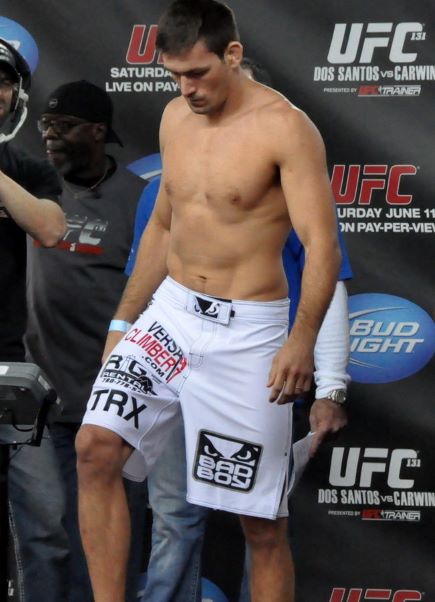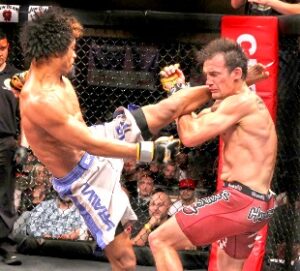
Have you recently seen a UFC weigh-in event and are wondering what happens if a UFC fighter misses weight?
In this article, we’ll look at what happens if a UFC fighter misses weight, UFC weigh-in rules, why UFC fighters miss weight, some of the worst UFC weight misses, and more.
Contents
- What Happens if You Miss Weight in UFC?
- 1. They’re Given an Extra Hour or Two To Make Weight
- 2. The UFC, the Authorizing Commission, and Both Fighters Can Negotiate a Catchweight Fight
- 3. They Miss the Opportunity to Progress in Their Division
- 4. They Lose a Percentage of Their Earnings
- 5. They Lose All Potential Bonuses
- 6. Title Fights Become Nontitle Fights for the Fighter Missing Weight
- 7. The Fight’s Canceled
- 8. They’re Forced To Move Weight Class or They’re Released
- UFC Weigh-in Rules
- Why Do UFC Fighters Miss Weight?
- Worst Weight Misses in UFC History – (UFC Fighter Misses Weight by 12 Lbs)
- Why Don’t UFC Fighters Fight in Their Natural Weight Class? (To Avoid Missing Weight)
- What Happens If a UFC Heavyweight Misses Weight?
- What Happens if You Miss Weight in UFC? – Summary
What Happens if You Miss Weight in UFC?
There are 8 things that happen if a UFC fighter misses weight, and these are:
1. They’re Given an Extra Hour or Two To Make Weight
After missing weight the first time, a fighter may be given the chance to weigh in a second time immediately, if they’re only over by half a pound and want to re-weigh for clarification purposes.
If they choose to do so and miss weight a second time, the Athletic State Commission of the UFC event decides on giving the fighter either an hour or two to drop extra weight and make weight for either the second or third time.
Most commissions only sanction extra time if a fighter is no more than 2 lbs above the upper weight limit of their division. More often than not, the extra time given to fighters is enough for them to drop up to 2 lbs extra and make weight and they’ll do this by sweating in a sauna or being wrapped in towels by their team.
2. The UFC, the Authorizing Commission, and Both Fighters Can Negotiate a Catchweight Fight
If a fighter can’t make weight after they’ve had the allotted time to shed extra pounds, all involved parties can negotiate a catchweight fight which means new contract terms for both fighters.
A catchweight fight is an agreed-upon fight outside of the usual UFC weight classes. For example, if a fight was scheduled to be a middleweight bout, which has an upper weight limit of 185 lbs, and a fighter weighed in at 189 lbs, if a catchweight fight can be negotiated it’ll be referred to as a 189 lbs catchweight.
Both fighters won’t have to weigh in again, as the UFC will use their most recent weigh-in weight.
3. They Miss the Opportunity to Progress in Their Division
The fighter who misses weight can’t progress in their usual division’s rankings even if they win, as the fight isn’t taking place in their initially contracted weight class – it’s now a weight-miss catchweight.
On the other hand, the fighter who made weight and agreed to fight at catchweight can still progress in the rankings if they win, because they’re technically still fighting in their weight class.
4. They Lose a Percentage of Their Earnings
During the catchweight negotiations, the fighter missing weight faces 20-30% deductions from their total earnings, as determined by the State Athletic Commission in charge of the event. In extreme cases, a fighter can lose 40% of their total earnings if they miss weight by an absurd amount (William Knight UFC 271).
Each athletic commission has its own rules regarding purse deductions, and these rules are undisclosed, and sometimes purse deductions are undisclosed too. Because fighters lose a percentage from their total earnings, they won’t know how much they’ve lost until it’s calculated post-fight.
What about the fighter who made weight?
The fighter who made weight takes a share of the purse deductions between themselves and the commission.
If it’s a 30% purse deduction, the commission takes 10 or 15%, while the fighter who made weight receives 15 or 20%. Again, this depends on the State Athletic Commission in charge, but mostly the fighter will take 50% or more of the total purse deductions.
5. They Lose All Potential Bonuses
Again, during catchweight negotiations, the fighter missing weight has to sign and acknowledge their ineligibility for any bonuses they may win, such as for Fight of the Night or Knockout of the Night.
And the fighter who made weight?
If any shared bonuses are won, they take their own half and also take their opponent’s half. For example, Rob Font missed weight and his fight with Marlon Vera became a catchweight (UFC Vegas 53). The bout won ‘Fight of the Night’, and Vera took home both $50,000 bonuses for a total of $100,000.
6. Title Fights Become Nontitle Fights for the Fighter Missing Weight
If a title is at stake, the challenger who misses weight is no longer able to become the champion, even if they win; and if they’re an interim champion, they’ll lose their title as well.
This is because they’ll be fighting at a catchweight, and no longer fighting at the championship weight, which is the upper weight limit of their originally contracted division.
If the UFC champion makes weight, they’re still able to increase their pound-for-pound ranking position, notch title defenses, and receive all of the earnings they’re entitled to.
However, if the UFC champion misses weight, they’re immediately stripped of the belt and they lose their title as the UFC champion. For them, it’s now a nontitle fight as they’re fighting at a catchweight, while the challenger who made weight is able to win the belt and become the champion if they win.
This was the case at UFC 274, where Charlies Oliveira became the first UFC champion to miss weight before a title fight and be stripped of his belt and title; after he weighed in half a pound too heavy, at 155.5 lbs. Even after being given extra time to cut weight, he couldn’t get down to 155 lbs.
On the other hand, Justin Gaethje weighed in at 155 lbs and was therefore eligible to claim the belt and become the UFC lightweight champion if he won; because for him, it’s still considered a title fight.
7. The Fight’s Canceled
If two fighters can’t agree to new terms and arrange a catchweight fight, the fight is canceled and the overweight fighter earns nothing. On the other hand, the fighter who made weight will receive show money, which is normally half of what they’d get if they were to win – but they’d also miss the opportunity to win various bonuses and the purse deductions from their opponent.
Another option is for the UFC to find a short-notice replacement. Before a fighter can step in on short notice, there have to be contract negotiations that all parties accept.
This is mostly to have the fighter who made weight agree to fight the replacement fighter, and for the replacement fighter to agree to money and terms and conditions.
Normally though, fights aren’t canceled because of a fighter missing weight, because the fighter who made weight knows they’re likely to receive a huge payday, especially if the fight wins some shared bonuses.
They’re also losing money if they cancel the fight as they’ll only receive show money, which isn’t a good place to be in for many fighters considering how much they’ve spent on fight preparation.
8. They’re Forced To Move Weight Class or They’re Released
If a fighter misses weight 3 or more times, the UFC can permanently move them up a weight division. This infamously happened to Kelvin Gastelum after his welterweight limit miss against Donald Cerrone and was subsequently moved from welterweight to middleweight.
Also, repeatedly missing weight can lead to being cut from the UFC. This happened to Anthony Johnson as he was cut the day after his fight at UFC 142, due to missing weight a third time, and this time by 11 lbs.
UFC Weigh-in Rules
The UFC weigh-in rules can affect whether a fighter is deemed as missing weight or not – and they’re as follows.
For title fights, fighters can’t be over the upper limit of the weight class division, and no lower than the lower limit of the division.
If it isn’t a title fight, fighters can be up to 1lb heavier than the upper limit of their weight class division, but no lower than the lower limit of their division.
Regarding catchweight fights, the Official Rules of MMA state a catchweight can only be negotiated if the fighter missing weight is under 5 lbs heavier than the lower weight fighter. As an example, if a fighter made weight at 145 lbs, the heavier fighter cannot weigh above 150 lbs.
If a fighter did weigh in more than 5 lbs heavier than their opponent, fights are usually moved up to the next weight division and are no longer catchweight.
As an example, William Knight vs Maxim Grishin was scheduled as a light heavyweight bout but Knight weighed in at 218 lbs, 12 lbs heavier than Grishin; therefore the UFC moved the fight to heavyweight (as agreed to by Grishin) which has an upper weight limit of 265 lbs. In this situation, all the penalties for missing weight still apply.
Other rules include commissions having the power to cancel catchweight bouts if they feel the weight disparity is large enough to make the fight unsafe.
Why Do UFC Fighters Miss Weight?
The main reason UFC fighters miss weight is being too heavy for the division they’re attempting to fight in and leaving themselves too much weight to lose.
Here’s a complete list of reasons why UFC fighters miss weight:
Poor judgment – A fighter leaving themselves too much weight to drop before a weigh-in means they’re unlikely to make weight in time.
Poor execution of a water weight cut – Fighters attempting to lose an insane amount of weight in the week before a weigh-in may overstretch themselves or make mistakes and not lose water weight effectively.
Poor health – extended periods of intense training, excessive fat loss, and botched water weight cuts have a high chance of leaving a fighter unwell. If a fighter becomes ill in the week before weigh-ins, they’re likely to miss weight as they’ll need to heal themselves, meaning the water flushing process will be ruined.
Laziness – Cutting weight is an extremely grueling process, and some fighters can’t see it all the way through, so they decide to give up and pay the penalties. Or a fighter can be lazy in their discipline after their last fight, and allow themselves to get too fat and far from their weight class.
Worst Weight Misses in UFC History – (UFC Fighter Misses Weight by 12 Lbs)
If a UFC fighter misses weight by a small margin of 1-2 lbs, they’re given the opportunity to make weight on a second attempt. However, there have been times when fighters have appeared to not have attempted to make weight, and here are a few examples.
William Knight vs Max Grishin (UFC 271) – The fight was scheduled to be at light heavyweight (205 lbs) but Knight missed weight by 12 lbs; meaning the fight was moved to heavyweight. His excuse was he accepted the fight on short notice.
Anthony Johnson vs Vitor Belfort (UFC 142) – The fight was scheduled to be at middleweight (185 lbs) but Johnson missed weight by 11 lbs. The fight was fought at a catchweight of 197 lbs because this was in 2012 before the 5 lb miss weight catchweight rule was introduced in 2016.
In the end, Johnson lost and was released by the UFC for this being his third time missing weight. This shows how seriously they take UFC fighters missing weight, as Johnson was a good fighter with a 22-6 record. The reason he missed weight was a botched water flush and being way too heavy for the middleweight division.
Rafael Alves vs Pat Sabatini (UFC Vegas:19) – The fight was scheduled to be at featherweight (145 lbs) but Rafael Alves missed weight by 11.5 lbs, weighing in at 157.5 lbs. The fight was canceled by the UFC as they couldn’t find a replacement and they couldn’t make it a lightweight fight because Alves was even above the lightweight limit. Alves claimed he ate Salmon which left him feeling unwell and therefore had to drink water which ruined his water flushing.
Why Don’t UFC Fighters Fight in Their Natural Weight Class? (To Avoid Missing Weight)
UFC fighters don’t fight in their natural weight class because they want to have an advantage in size and power, which in theory they can do by fighting in a lower weight class. In reality, every fighter is cutting weight, so they’re really looking to level the playing field and not be at a huge disadvantage.
If they didn’t cut weight and fought at their natural limit, they’d be fighting a guy naturally 20 lbs heavier than them, who just executed a water flush the week before weigh-in.
Ultimately, you can’t ban UFC fighters from cutting weight, because there are likely to be ways around it and the fighters who find a way, will have a huge advantage. Despite weight cuts being dangerous, it’s part of the UFC’s history and MMA in general, so it’s going to be around for a while.
There are, however, ways to stop extreme weight cutting, which is what the California State Athletic Commission has done, by implementing a rule (2019) that states fighters aren’t allowed to weigh more than 15% of their Friday weigh-in weight, on their Saturday (fight day) weigh-in.
For example, if a fight was scheduled at middleweight, which has an upper weight limit of 186 lbs for nontitle fights, a fighter isn’t allowed to weigh more than 212.75 lbs (185 x 0.15) – which is 26.75 lbs above 186 lbs.
So, in California UFC events, if a fighter weighs in on fight day more than 15% above their Friday weigh-in weight, the fight is canceled.
What Happens If a UFC Heavyweight Misses Weight?
Despite there being a much wider weigh-in range (205-265 lbs), some heavyweights have to cut weight to make the upper limit of 265 lbs, and 266 lbs for a nontitle fight. If a UFC heavyweight misses weight the same consequences apply, with a catchweight likely being negotiated.
Here are a few examples of UFC heavyweights struggling to make weight:
Justin Tafa vs Henry Hunsucker (UFC Vegas: 45) – Justin Tafa missed weight by 1lb when he weighed in at 267 lbs, becoming the first UFC heavyweight to miss weight. He missed weight because of a botched weight cut and didn’t attempt a second weigh-in because he thought it would affect his ability to fight if he continued to sweat out more water. Therefore, the fight became a 267 lb catchweight.
Greg hardy vs Maurice Green (UFC Vegas: 12) – Greg Hardy’s weigh-in weight was 266.5 lbs, half a pound over the heavyweight non-title fight limit. He was given an extra hour and made weight the second time at 266 lbs. Greg Hardy struggled because his walk-around weight is around 285 lbs, so he had to cut nearly 20 lbs to make weight.
Derrick Lewis vs Blagoy Ivanov (UFC 244) – Although Derrick Lewis made weight quite comfortably, his walk-around weight is between 290-300 lbs and he had to drop 40 lbs+ in order to make weight. This was done through a combination of cutting body fat and a well-executed water flush.
What Happens if You Miss Weight in UFC? – Summary
If a fighter misses weight in the UFC, usually a catchweight fight is negotiated, or a replacement fighter is found, but it’s not uncommon for fights to be canceled. For this reason, there are many penalties for the fighter who misses weight, whether they fight or not.
Most often, UFC fighters miss weight because of a botched water flush, and with weight cutting in full swing and no end in sight, there are going to be many more UFC fighters missing weight; it’s just part of the sport of MMA.




